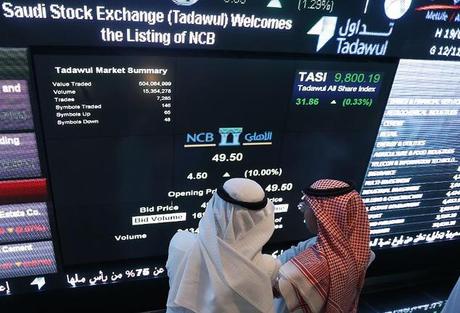Tight-lipped Saudi Opens Up to Push Economic Plan

Pushed by international advisers and concerned about its image, conservative Saudi Arabia is engaged in an unusual display of openness to promote a wide-ranging economic transformation plan.
Over four nights this week, 16 government ministers took the stage at a cramped state television studio in the humid Red Sea city of Jeddah to field questions from local and foreign reporters.
Press conferences are traditionally rare in the kingdom, whose top officials are unelected. This week's sessions, which began on the first day of the Muslim holy month of Ramadan, were unprecedented.
But officials say "transparency" -- a word they use frequently these days -- is essential to the success of the National Transformation Programme (NTP).
The 112-page document, a tool to implement the over-arching Vision 2030 plan, sets five-year targets for transforming the oil-dependent economy following a slump in crude prices.
The reform drive is led by King Salman's 30-year-old son Prince Mohammed bin Salman, who has risen to be among Saudi Arabia's most influential figures since being named second-in-line to the throne last year.
Prince Mohammed set an example in April when he stood before reporters and, seeming relaxed, answered questions about the Vision for almost one hour.
"There is an element of transparency," Minister of Economy and Planning Adel al-Fakieh said during Wednesday night's televised press conference.
Questions also came from citizens on Twitter.
By setting benchmarks, the NTP allows for accountability, which will be reinforced by a special body to monitor the performance of government agencies, Fakieh said.
The system makes it possible that "we will see a breakthrough leap in the performance of the government," he added.
Fakieh's ministry is one of 24 government agencies given initial targets under the NTP.
In his case, the economy and planning ministry will be judged on its handling of objectives at the heart of the Vision: diversifying gross domestic product, growing the private sector, and increasing the efficiency of government subsidies.
At the centre of the reform effort is a plan to float less than five percent of oil giant Saudi Aramco on the stock market, with the proceeds to help form what will become the world's largest state investment fund, with around $2 trillion in assets.
- 'The public should know' -Fakieh said the NTP is the result of input from about 10 consulting firms and more than 600 Saudi officials who attended months of discussions and workshops.
"We do not claim that the initiatives in this programme are final," he said, calling for constructive public criticism to help it succeed.
Fakieh downplayed the input of foreign experts.
"We realise that it's only us understanding our own local context that can really make the best use of this international expertise," he said.
Last December the McKinsey Global Institute, the research arm of McKinsey & Co consultancy, published a 156-page report on "Saudi Arabia Beyond Oil: The Investment and Productivity Transformation."
That document talks of a need for "greater accountability, coordination, and performance management" by government.
"The public should know more about what is happening, too," said the report which is available on the Internet.
McKinsey was also among firms contracted by the government to advise on the kingdom's economic future, Bloomberg News reported.
"They've been guided definitely, very, very strongly by McKinsey", including in the emphasis on transparency, said Patrick Dennis, lead Middle East economist at British-based advisory firm Oxford Economics.
Government openness is needed for effective decision-making, proper functioning of the market, and to avoid corruption which typically leads to lower growth, he told Agence France Presse.
Transparency, however, is "something that will come later over time", Dennis said.
Jason Tuvey, of the London-based research firm Capital Economics, said officials are now emphasising openness "because they need to improve their reputation" in that area.
"If they are not more transparent with their policies, it will only raise further question marks over their ability to deal with the fallout from lower oil prices," he told AFP.
This year's budget announcement had already helped make clear to investors that, rather than a currency devaluation, fiscal policy would be relied upon to deal with the oil price slump.
But Tuvey said Saudi transparency will have its limits.
"I would never expect the authorities to provide highly detailed information and policies, such as you get from policymakers in advanced economies."



